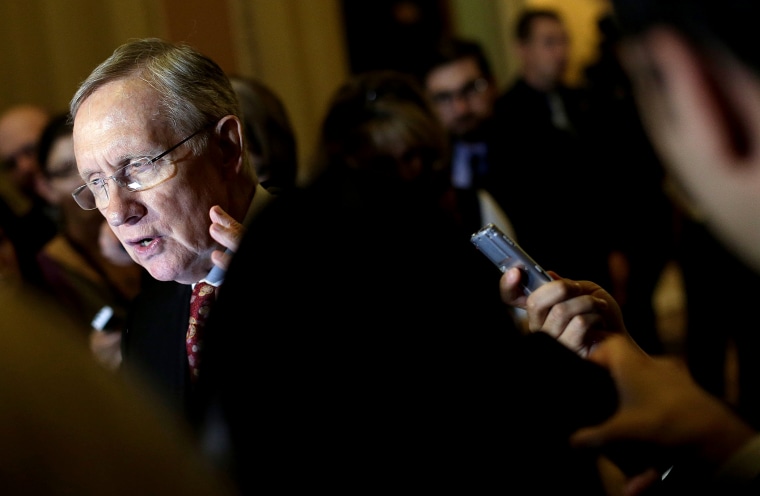Harry Reid is threatening to go nuclear – again.
The Senate majority leader says he is weighing the possibility of changing the Senate rules to prevent Republicans from filibustering President Obama’s judicial nominees.
“I’m considering looking at the rules,” the Nevada Democrat told reporters on Tuesday. "The American people are sick of this. In the name of simple fairness, any president, not just President Obama, Democrat or Republican, needs to be able to have the team that he wants in place," Reid added.
Reid’s threat comes as Senate Republicans blocked – for the third time in three weeks—Obama’s pick, Robert Wilkins, to be a judge on the powerful D.C. Court of Appeals. Reid had a solid majority, but due to GOP's exploitation of the Senate's arcane rules, Democrats still fell six votes short of ending debate on Wilkins’ nomination.
If Reid decides to move forward, the filibuster rules would be overhauled in this Congress so that the GOP threat of filibuster didn't effectively require 60 votes to get anything done.
Reid has long threatened to make such a change. There are clear incentives -- Republicans in the upper chamber could no longer block Obama's nominees -- but drawbacks, too. After all, Democrats won't always hold a Senate majority -- they may well lose it next year -- and by setting a reformed-filibuster precedent, Dems could find themselves without a key tool when they're inevitably in the minority again.
The majority leader did not say whether he has the 51 votes required to officially change the rules. But some Democratic senators who have been against changing the rules –including Dianne Feinstein and Barbara Boxer—say they would consider it.
Feinstein even told NBC News, “I have changed my mind, and I am for it.”
Over the summer, Republicans blocked a number of executive nominations, including Richard Cordray as permanent director of the Consumer Financial Protection Board. But Republicans eventually hammered out a deal and approved the nominations in exchange for Democrats agreeing not to alter the rules.
Sources tell NBC News that this time may be different, as Republicans are less likely to cave and Dems are furious that the GOP is seemingly blocking every nominee for the sake of partisanship.
Republicans, meanwhile, are arguing that the court’s workload does not justify three more judges and said Democrats are merely trying to distract Americans from the troubled rollout of HealthCare.gov.
"Unfortunately, the Senate will not be voting on legislation to allow Americans to keep their health insurance if they like it, as they were promised again and again," Senate Minority Leader Mitch McConnell said Monday on the Senate floor. "Rather, we will be voting on another nominee to a court that doesn't have enough work to do."Meanwhile, Obama released a statement criticizing Republicans for blocking Wilkins, Patricia Millett and Nina Pillard, who have received the highest possible rating from the non-partisan American Bar Association.
“This obstruction is completely unprecedented. Four of my predecessor's six nominees to the D.C. Circuit were confirmed. Four of my five nominees to this court have been obstructed. When it comes to judicial nominations, I am fulfilling my constitutional responsibility, but Congress is not,” Obama said.
"Instead, Senate Republicans are standing in the way of a fully-functioning judiciary that serves the American people," he added.
